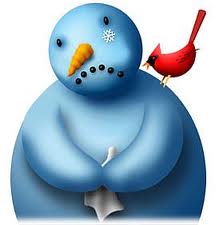 I recently had the opportunity to speak with Dr. William Krowinski of Life Works Erie (link) about something I have noticed over the years. That is, during all of this holiday period, there are a lot of folks who just seem pretty down. So, I asked him about this thing with “holiday blues,” or is it actually depression? Here are his answers.
I recently had the opportunity to speak with Dr. William Krowinski of Life Works Erie (link) about something I have noticed over the years. That is, during all of this holiday period, there are a lot of folks who just seem pretty down. So, I asked him about this thing with “holiday blues,” or is it actually depression? Here are his answers.
Is there such a thing as holiday blues or is it just another name for depression?
“Holiday blues as a psychological condition is distinct from clinical depression. We tend to think of the holidays as a joyous time, getting together with family and friends, preparing and exchanging gifts and well wishes, fixing and partaking of traditional desserts and meals. However, for some, particularly the elderly, they can also be a time of sadness with a sense of loss.
Why is that?
Our mind is always referencing the past to make sense of and guide us in the present. We don’t invent Christmas or Hanukkah each year. It’s an annual celebration whose meaning and rituals are largely derived from past celebrations. So this holiday is in many respects a reflection of past experiences. Whether consciously aware of it or not, we ask ourselves where was I last year, who was I with, who was there, what did we do, how did I feel and so on. For many elderly, this referencing inevitably involves realizing who isn’t here this year, including spouse, friends and family members; and what did I do in the past and am I able to do it now? Recognition of these significant losses and limitations produce feelings of loss and sadness.
Do all elderly suffer from holiday blues?
If they have experienced significant social losses and physical limitations, I would say yes but with some qualification. Some people are psychologically resilient so loss is not as devastating and their sadness isn’t as severe. Some people have a large social network full of friends and family members, which tends to offset any one loss.
Is there a difference between holiday blues and depression?
Yes. Examining the duration and severity of the sadness, as well as identifying other symptoms allows us to differentiate between the two conditions. Regarding duration, holiday blues end when the holiday is over. Clinical depression continues for months and sometime years if left untreated. With depression, a person’s ability to socialize and take care of him or her self is negatively affected. Other symptoms tend to include loss of appetite and weight, insomnia, anxiety, difficulty concentrating, feelings of discouragement and hopelessness, lack of energy and motivation, and sometimes-suicidal thoughts.
What can be done to help a person experiencing Holiday Blues?
First let me say what you shouldn’t do. Don’t tell the person “you shouldn’t feel that way” or “just snap out of it.” We don’t choose our feelings. People suffering from the holiday blues or depression need to be treated with empathy and compassion. In addition to recognizing the person’s feelings, ask, “Is there anything I can do to help?” Offer to take the person shopping, to church, for a walk and other activities. Offer to include him or her in holiday preparation activities such as baking cookies, buying a Christmas tree, decorating the house and so on. Even if the person declines your offer, they know you are thinking about him or her.
Do you have any suggestion for the person who is experiencing Holiday Blues?
First, recognize that there is reason to feel sad. Accept the sadness and view it as a messenger. Frequently our sadness informs us of the joy that a deceased loved one has brought our life. Next, try not to isolate yourself. Don’t turn down opportunities to be with family and friends. Regarding physical limitations, grieve the loss of what you once could do; while at the same time do what you can do. Remember that life is a about transitions – the athlete becomes the coach, the actor the director, the mother the grandmother and so on. Celebrate the past but let go and embrace the season of your life. And remember there is always someone who needs your help. Helping others, even in small ways, creates meaning and purpose in our lives.
Dr. William Krowinski Ph.D., LCSW, a psychotherapist specializing in marriage and family and a guest speaker at LifeWorks Erie (www.wjkphd.com). Lifeworks Erie, located in NW Pennsylvania, is a partner of CCM. They provide services and resources for seniors interested in staying mentally and physically active.
Charlotte Bishop is a Geriatric Care Manager and founder of Creative Case Management, certified professionals who are geriatric advocates, resources, counselors and friends to older adults and their families in metropolitan Chicago. Please email your questions to ccbishop@creativecasemanagement.com.



